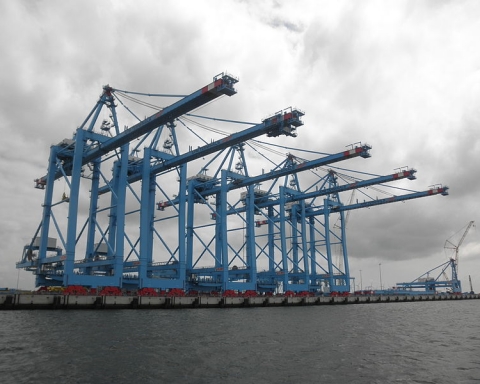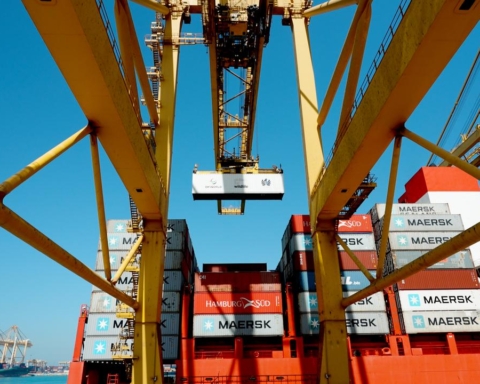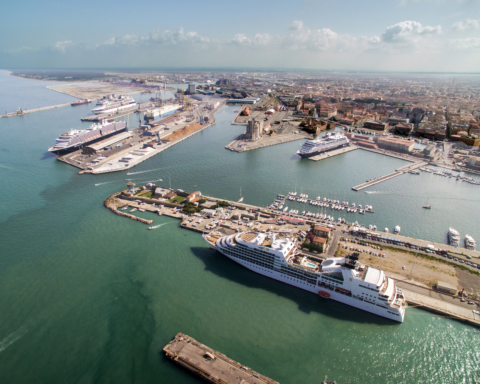Xi Jinping’s China is the end point of a centralized, absolute, Chinese Communist Party-based power system. That system originated in the Long March of the Maoist Revolution seventy years ago. The same system evolved in the 1960s in an even more repressive one through the Cultural Revolution. It was still the same system that, so to speak, regenerated itself in 1989, with the blood spilled in the repression of a youth movement longing for freedom and reform that was massacred in Tiananmen Square. A grim historical paradox, at a time when communist tyrannies were wiped out in other parts of the world.
Xi Jinping’s China proudly claims its communist and Maoist past as a legacy of values and political principles to be pursued and proposed to the world. That is why today it is so necessary to address with the utmost decision and with great cohesion, national and European, the issue of the economic, political, cultural “Chinesization” of the world through the Silk Routes and the “One Belt One Road Initiative“.
Silk Road ports and new predators
The “Silk Road” – Maritime Silk Road (MSR) – comprises various routes while maintaining a very flexible approach in the decision-making process on the location of ports. The routes start from China’s eastern coastal provinces and move through the following target corridors: Southeast Asia and the Pacific, including Central and South America; to East Africa (linked to West Africa by road and rail, but potentially also connected to West African ports); through the Gulf of Aden and the Red Sea and in the Mediterranean through the Suez Canal; and through the Arctic Ocean to Russia (the so-called Polar Silk Road). The United Kingdom is not yet included in the MSR.
Port locations are chosen as part of China’s wider strategic endeavor to redirect shipping routes in order to gain a dominant position in international shipping and to increase trade through containerized ports built and managed in China.
The increasing development of these ports is causing widespread concern about this emerging dominion and its consequences for the global maritime sector. As in the other cases of acquisition of strategic networks, this “frenzy” for port projects and infrastructures has the precise objective of influencing the policy and decision-making processes of the countries in which Beijing invests, as witnessed in those countries that have received massive investments, going against the fundamental principle of State sovereignty.
The lack of transparency in the MSR and its port infrastructure prevents any balanced negotiations between China and host countries. The potential negative environmental and socio-economic impacts of BRI projects are totally overlooked, with serious repercussions – already being experienced by some of the countries concerned – on sustainable development, the economy and the sustainability of the social fabric.
MSR commercial ports have the potential for dual civilian/military use and could be precursors to more Chinese military and logistical bases in the future, with a combination of flexible and smaller foreign military bases, such as a myriad of “water-lilies”, and commercial ports for surveillance purposes. This prospect is giving rise to growing concern because of the strategic implications of the transfer of global port infrastructure: in times of political tension, leaving privileged access for the deployment of the People’s Liberation Army does not allow us to imagine a bright future.
China claims to be a strong advocate of freedom of trade, but understands it as the freedom to invade foreign markets and instead keeps its own market strictly controlled, protected and – when useful – isolated.
One such example is what can be called the “robbery contract” with the Democratic Republic of Congo: investments in roads, railways, Chinese infrastructure for $ 9 billion in ten years (with 100% Chinese workers) and exclusive exploitation of the Kowelezi mines, transferring 10 million tons of copper and 500 thousand tons of cobalt to China. It is estimated that in a decade, in the face of Chinese “investment” of $ 9 billion, a return of about $ 50 billion will be secured in Beijing and the dispossession of entire regions of Congo.
The same operations are underway in Sub-Saharan Africa and in the Horn of Africa, where villages are being depopulated and the traditional local economy destroyed, the local population being replaced by Chinese communities, provoking increasingly enormous flows of migrants to Europe.
Beijing über alles?
China claims to invest strategic networks in energy, transport, digital economy in Europe and America in order to gain full control. On the other hand, China prohibits foreign investment in the same networks in its own country. Beijing demands that Huawei enter our 5G (a dimension that increases the power of the Internet a thousand times) to dominate the management and flow of our data but rigorously protects all Chinese cyberspace from European and American telecommunications companies and operations. A picture of the situation is provided by “Freedom House”, which, in its annual report on the state of Internet freedom, “Freedom on the Net 2018” placed China in last place among the 65 countries evaluated.
Beijing demands “exclusive rights” in every sector in the world and the Conte Government, more than any other European Government, rushes to give them what they want. Beijing wants exclusive rights for its propaganda in our media, provided for in the Memorandum of Understanding (MoU) irresponsibly signed last March by our Government on the strong impulse of the 5 Star Movement.
In education, hundreds of Confucius Institutes are invading the best Western universities. Beijing directly overseas teachers’ curricula in the smallest detail while history is being taught through the filter of the Chinese Communist Party. The “principle of reciprocity“, a fundamental principle in international relations since the Treaty of Westphalia, is a stigma for the Chinese. For Xi Jinping it is the “peculiarity” of China that must be, first of all, recognized and praised.
Beijing proudly affirms the uniqueness and superiority of its political, cultural and economic model and imposes it on countries that are in a phase of less advanced economic development than China. It affirms models, rules alternative to our liberal democracy, to the rule of law, to those principles of freedom that we value above all else.
Xi Jinping officially declared it in a political manifesto released shortly after his inauguration at the Presidency, which demonized “the unspeakable seven principles” to be contrasted because they are Western values. These include liberal democracy, human rights, freedom of the media, the right to criticize. An invitation to seriously reflect on the grave situation of freedom of expression in China is to be found in the census carried out by the “Committee for the Protection of Journalists“: in 2018, there were at least 47 cases of imprisoned journalists and it is not hard to believe that the number is much, much higher.
A tragic illusion
It is now widely admitted by all, except for a few “useful idiots” – or for the numerous people who already expect to draw personal profits from Chinese political, economic and cultural supremacy – that China’s admission to the WTO back in 1999, on the basis of unilateral concessions from the West, was based on an illusion and on a false assumption. All this should make those responsible for promoting the common opinion of China’s democratic “potential” in recent decades to feel most ashamed.
Twenty years ago, there was the illusion that the growth of the economy would generate a parallel drive towards opening up the political system to freedom and respect for the rule of law. How can we define those who still have the sheer nerve to support this opinion in the face of facts like the disgusting human rights situation; concentration camps everywhere in Xinjang; the brutal denial of religious freedom and Christianity (despite unilateral concessions made by the Catholic Church); the disappearance of thousands of citizens without trial; the habitual use of torture and violence by the police; the total suppression of any personal and political freedom in an Orwellian state that criminalizes opinions, thoughts, kinship, behavior and even facial expressions, through millions of sophisticated cameras and behavior detectors?!
To those who still delude themselves about Communist China, we could suggest a few examples. The president of the Religious Freedom Institute, Thomas F. Farr, in a hearing in November 2018 at the Executive Committee on China of the US Congress, described the suppression of religion in China as “the most systematic and brutal attempt to control Chinese religious communities since the Cultural Revolution.”
The brutal religious and cultural oppression of Tibetans in China has been going on for almost 70 years. China, however, has not only tried to destroy the Tibetan religion. Christianity, for example, has always been seen as a direct threat to the People’s Republic of China since it was established in 1949. The regime demolished churches and removed crosses. They were replaced by the national flag. The effigies and images of Jesus have been replaced with those of President Xi Jinping! Dramatic is also the repression of the Uyghurs, Muslims in Xinjang: 25 million people in the western province of Xinjang China and between 1 and 3 million of whom are now locked up in internment camps for “political re-education”. Their children, as revealed by a recent terrible documentary by CNN, imprisoned in other “school camps”, in fact prisons surrounded by high walls from which tens of thousands of children and young people, torn from their families, can no longer leave.
“Chinesization” forced on us
In 1999, when the mistake was made of admitting China to the WTO without any conditions whatsoever, it was based on another assumption, which also proved to be completely false. It was thought that the growth of Chinese exports to the West would be rebalanced by the development of a huge domestic demand, to the benefit of Western exports and investments. The enormous wealth accumulated by China through an immense, growing trade surplus, together with the equally immense US and EU deficit towards China, have, instead, demonstrated the seriousness of this mistake for years.
The conflict that all this causes is certainly not solvable in the short or medium term. The issue of “Chinesization” must be tackled with the utmost urgency and can no longer be downsized – let alone evaded – on an Italian, European or global scale.
Beijing’s pressure is increasingly concentrated on Europe, in particular on what Xi Jinping believes to be the weak link in the European anchorage: Italy. Our country represents the biggest morsel in Europe for the Chinese Dragon, which has already devoured and digested its prey in Greece (with the Port of Piraeus) and in Portugal (with the ridiculously cheap acquisition, in the 2012 post economic crisis, of the Portuguese electricity network with important renewable energy branches in Europe).
Are we going to be the next morsel?
The Dragon has long since planted his large feet in certain strategic Italian enterprises. The real problem now, however, is the leap forward that, with an incredibly suicidal spirit, the Conte Government has encouraged the Chinese regime to make in Italy, signing the famous Memorandum of Understanding (MoU), a very challenging political document, with the Chinese superpower.
The Conte Government “sold” us the nonsense that it was not an important document since it was “only” a political document without a clear legal nature and that the MoU was not a Treaty ratified by Parliament, which would have led Italy straight to the Court of Justice for violation of European Treaties and the exclusive commercial powers of the Commission.
The Conte Government has moved almost entirely on the impulse and will of the 5 Star Movement and has made irresponsible political commitments. You just don’t sign undertakings – much less with an assertive superpower like today’s neo-imperial China, committed to promoting principles and rules in net contrast to European and the Atlantic ones – and even worse so if these types of commitments are “only” political.
Can you imagine the moment when we had to try to get out of the cage in which we locked ourselves up with the Chinese Dragon, for instance, collaborating on Chinese BaiDou or Yeasong satellite programs, which also have a military nature and belong to the Chinese Armed Forces and Intelligence? Or the moment when we could not honor, without changing alliances, our “only political” promise to conform to the objectives of Beijing, for example, in the occupation and militarization of the China Sea or on Taiwan or Hong Kong?
If we only so much as hinted at doing so, we would be immediately punished, with extreme harshness. through economic retaliation, as has been the case with many countries (Canada, South Korea, the Philippines, and others) that in recent years, despite having Chinese investments in their areas, have taken the liberty of disagreeing and criticizing the Beijing crimes at the UN Human Rights Council or in the Security Council and in the UN General Assembly. Countries which, unlike us, were very careful not to sign absurd memoranda with the Dragon.
You can only smile when you hear the theory of the “purely political” commitment of a country like ours, with a population equal to 4% of the Chinese one, a GDP equal to 1/8 of China, a Defence and Armed Forces budget overall lower than 1/20 of those of a China Nuclear Power, permanent member of the UN Security Council, increasingly a protagonist in all the undisputed International Organizations, little contested by a less and less multilateralist America.
What is the Conte Government talking about, when it thinks of downsizing the atrocious error of bsigning that “purely political” MoU? containing very far-reaching commitments, undertaken by a gnome with a giant who is certainly no less clever, ruthless, demanding and attentive than the imprudent gnome who has very happily entered the cage..
5 Star pirouettes
Discussing how this could happen is perhaps superfluous, as often happens when trying to find a thread of rationality in the line of the M5S ingrained with stereotypes, ideologisms and lack of objective information. In the Western world, this Movement can boast the primacy of being the only important parliamentary force that seems to be attracted more than any other, irresistibly attracted, by all that in the world continues to smell of “communism”.
China is a “fatal attraction” for the Grillino establishment, as they are – in their ill-fated realities – Maduro’s Venezuela, Castro’s Cuba and the Alba group countries in Latin America. Yet even on the China issue, the Movement founded by Beppe Grillo has done a number of shameless pirouettes, ignoring (for what reasons?) the serious damage that all this causes to the country.
In a post by the Grillini parliamentarians in July 2014 on China’s buying into Terna, it was stated: “When we talk about sovereignty, we also talk about the most delicate strategic assets and key activities of a country”. Then they continued directly attacking Beijing: “And yet this time it’s very scandalous: not only has part of a strategic energy asset been sold off , not only is that asset profitable and brings money to the country’s coffers, but do you know to whom it’s being sold off to? To the Chinese”. They also said: “The government is convinced that a strong partner is also needed, perhaps because so much sovereignty remains truly too indigestible”. Moreover, they attacked the minister Pier Carlo Padoan, guilty of “going on a pilgrimage to Beijing to close the State Grid Corporation of China agreement with the Chinese “. So Padoan went on a “pilgrimage”, while Luigi Di Maio did not.
There was more to it than that. “Foreign governments on the Italian electricity network, on the information that travels on it, and also on the customers’ sensitive data, which concern the entire national community. Normal administration: the country and its inhabitants have long since lost all value, while their rich properties are sold off left and right. This, before going to government. In short, the Grillini made exactly the same speech today by those who oppose Huawei in Italy for the 5G network. According to the Government, perhaps now “emerging profit” counts more than security and national sovereignty for them.
Cantonese Rule of Law
The clash happening now – deliberately kept out of the media spotlight, even in Italy as we well know – is not just economic. It is a clash for political supremacy and values on a global scale. In the decades after the Second World War, the West, certainly “helped” by the sharp contrast of values that the Cold War provided, has been at the forefront in the development of international instruments to defend the universal values of human rights and the rule of law, values and instruments without which democracy cannot live.
Over the last few years, after the aforementioned mistake of China’s full membership to the WTO in the hope that greater economic openness and prosperity would lead to democratization, it was not the West that managed to impose its vision of a world order, but rather the erosion of that order by Beijing and similar regimes.
China has never been loyal to the universal principles it had subscribed to and, in recent years, we have been witnessing, if anything, its brazen vindication of opposing principles instead. “Human rights with Chinese characteristics” and “the rule of law with Chinese characteristics” are slogans that are now proudly pursued within the United Nations. The principle of obedience to Beijing by Chinese officials in international institutions is also openly affirmed and claimed, even if it violates the “sworn” duty of those very officials upon taking office. There are countless anonymous complaints by other UN officials about Beijing’s continuing pressure on them.
Very few governments today react to this bullying, aimed at rewriting the most basic universal rules that the world has given itself since 1946. Italy is one of the first countries to surrender. This is exactly the reason why “Chinesization” should concern us so much: not only because of what happens there but for the erosion of the very principle of the rule of law.
Translation by Giles Foster




